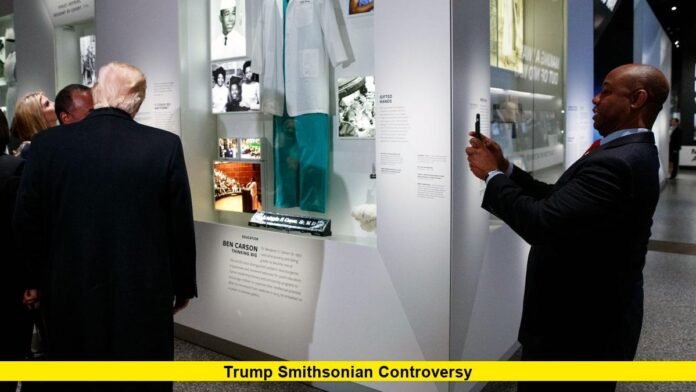Former President Donald Trump has again placed the Trump Smithsonian debate in the spotlight, this time criticizing the institution for what he describes as an excessive focus on slavery and other “woke” interpretations of American history. Reports indicate that Trump has asked his legal team to review museums nationwide, specifically targeting exhibits that, in his words, portray the United States too negatively.
Trump’s remarks were directed at the Smithsonian Institution, known as the world’s largest museum, education, and research complex, which curates some of America’s most comprehensive historical exhibits. During a recent statement, Trump singled out displays addressing slavery, suggesting that the museums highlight its horrors without acknowledging other aspects of the nation’s development.
What Trump Said About the Smithsonian
According to recent coverage, Trump instructed his lawyers to “go through America’s museums” to identify and flag exhibits that he believes promote a political agenda. He accused the Smithsonian of being too focused on showing how bad slavery was instead of balancing the narrative with other themes in U.S. history.
In Trump’s view:
- The Smithsonian should not “shame” Americans with heavy-handed presentations on slavery.
- Museums must present history in what he sees as an “objective” way.
- Exhibits labeled as “woke” misrepresent the founders and long-term achievements of the nation.
These comments reflect Trump’s consistent criticisms of cultural institutions, which he claims are influenced by progressive narratives at the expense of patriotic storytelling.
Smithsonian’s Existing Exhibits on Slavery and History
The Smithsonian operates more than a dozen museums, including the National Museum of American History and the National Museum of African American History and Culture (NMAAHC). The latter has been praised internationally for documenting the story of African Americans from slavery through the present day.
Key highlights include:
- Authentic slave shackles and personal testimonies.
- Exhibitions on the Civil Rights Movement.
- Cultural and artistic contributions by Black Americans.
Historians widely emphasize that slavery is foundational to understanding the country’s past. Many experts argue that omitting or minimizing these narratives would amount to historical erasure.
Political and Public Response
Trump’s remarks have sparked sharp reactions:
- Supporters agree that museums should broaden their exhibits beyond oppression to showcase innovation, economic growth, and national pride.
- Historians and critics argue that slavery is an essential, factual part of U.S. history and minimizing it risks undermining the Smithsonian’s credibility.
- Public figures on X (formerly Twitter) and Instagram weighed in, with responses split between calls for “patriotic history” and strong defense of academic integrity.
At the same time, cultural organizations expressed concern over the notion of political interference in curatorial decisions. For many, independent museum boards—rather than politicians—should determine how history is narrated.
Why the Trump Smithsonian Dispute Matters
The controversy is not just about one institution—it reflects a larger debate over how America teaches and remembers history. Trump’s focus on exhibits about slavery touches on ongoing disputes in schools, libraries, and media across the country.
- Educational Impact: Museums serve millions of visitors each year, including school groups, making the Smithsonian central to history education.
- Cultural Integrity: Critics say selective editing of history could threaten public trust in museums.
- Political Symbolism: Trump’s targeting of the Smithsonian aligns with broader conservative efforts to push back against what they label “woke narratives.”
What Comes Next for the Smithsonian
As of now, the Smithsonian Institution has not released an official statement directly responding to Trump’s remarks. Museum curators and historians continue to defend comprehensive storytelling, underscoring the importance of facing difficult truths about the past.
It remains unclear whether Trump’s lawyers will pursue any formal action regarding museum exhibits. However, the political and cultural debate over the representation of slavery in U.S. history is almost certain to continue.
For the Smithsonian, the challenge lies in balancing its role as a custodian of historical truth with navigating increasing political pressure from both sides of the aisle.
Closing Thoughts
The Trump Smithsonian debate raises one of the most pressing cultural questions of our time: Who gets to decide how America tells its history? With millions engaging in this conversation online and in person, it’s clear that museums, politics, and education are deeply intertwined.
How do you think history should be presented in museums—through an unfiltered lens of truth, or through a patriotic narrative that uplifts the nation? Share your thoughts below and join the conversation.
